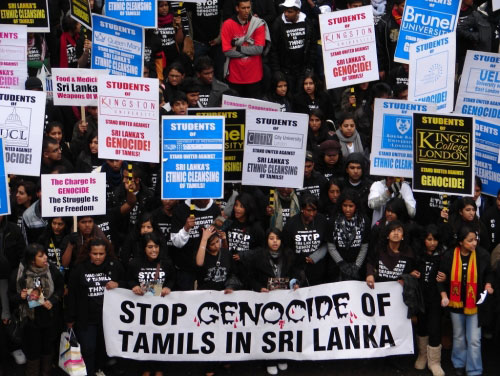 |
One of Scotland's largest companies, the Weir Group, was this week fined £3m for breaching UN sanctions on Iraq by doing business with Saddam Hussein's regime. £13.9m of illegal profits were also confiscated, the BBC reported.
Last year four British Parliamentary committees issued a joint report arguing that all arms licenses to Sri Lanka should be investigated, as UK-supplied weapons had been used against Tamil civilians.
See these reports by The Times, Daily Telegraph and Channel 4.
In mid 2007 it emerged in a British parliamentary debate that UK had licensed £7 million worth of weapons and military equipment for export to Sri Lanka so far that year alone – the same value of aid the UK had provided after the 2004 tsunami.
The UK exported over £1m of arms in late 2008 - just as Sri Lanka began mass bombardment of concentrated Tamil civilians, eventually killing over 40,000 people.
Indeed, between April 2008 and April 2009, the UK issued 34 arms export licenses to Sri Lanka.
At the same time, international community - including Britain - was calling for a ceasefire.
In Feb 2009, UK Foreign Secretary David Miliband told Parliament that the humanitarian crisis was getting "get worse day by day" (see transcript here).
In April 2009, Sri Lanka dismissed as a 'joke' Britain's call for a humanitarian ceasefire.
Also that month, Mr. Miliband and his French counterpart, Bernard Kouchner, visited Sri Lanka but Sri Lanka rejected their plea to allow humanitarian access by the UN to the Tamil civilians trapped in the warzone.
Mr. Miliband had got into a 'heated argument' with Sri Lanka's Defence Secretary Gotabhaya Rajapaksa, The Times reported. (See also The Guardian's report)
Britain revoked nine arms exports licenses in late 2009 - after the war ended.
In January 2010, the UK government told the Parliamentary committees on Arms Export Controls it had been "concerned about the Sri Lankan situation for quite a long period of time".
